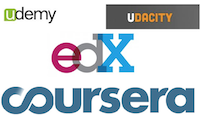Content or platform: Why do students complete MOOCs?
 The advent of massive open online courses (MOOCs) poses new learning opportunities for learners as well as challenges for researchers and designers. MOOC students approach MOOCs in a range of fashions, based on their learning goals and preferred approaches, which creates new opportunities for learners but makes it difficult for researchers to figure out what a student’s behavior means, and makes it difficult for designers to develop MOOCs appropriate for all of their learners. Towards better understanding the learners who take MOOCs, we conduct a survey of MOOC learners’ motivations and correlate it to which students complete the course according to the pace set by the instructor/platform (which necessitates having the goal of completing the course, as well as succeeding in that goal). The results showed that course completers tend to be more interested in the course content, whereas non-completers tend to be more interested in MOOCs as a type of learning experience. Contrary to initial hypotheses, however, no substantial differences in mastery-goal orientation or general academic efficacy were observed between completers and non-completers. However, students who complete the course tend to have more self-efficacy for their ability to complete the course, from the beginning.
The advent of massive open online courses (MOOCs) poses new learning opportunities for learners as well as challenges for researchers and designers. MOOC students approach MOOCs in a range of fashions, based on their learning goals and preferred approaches, which creates new opportunities for learners but makes it difficult for researchers to figure out what a student’s behavior means, and makes it difficult for designers to develop MOOCs appropriate for all of their learners. Towards better understanding the learners who take MOOCs, we conduct a survey of MOOC learners’ motivations and correlate it to which students complete the course according to the pace set by the instructor/platform (which necessitates having the goal of completing the course, as well as succeeding in that goal). The results showed that course completers tend to be more interested in the course content, whereas non-completers tend to be more interested in MOOCs as a type of learning experience. Contrary to initial hypotheses, however, no substantial differences in mastery-goal orientation or general academic efficacy were observed between completers and non-completers. However, students who complete the course tend to have more self-efficacy for their ability to complete the course, from the beginning.







